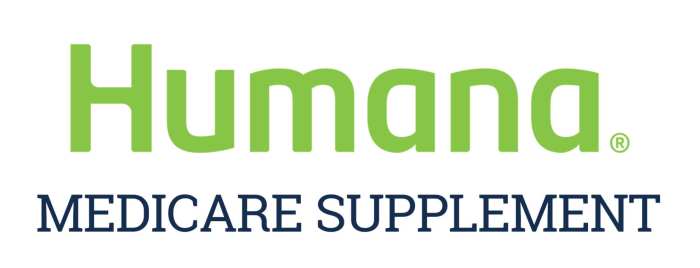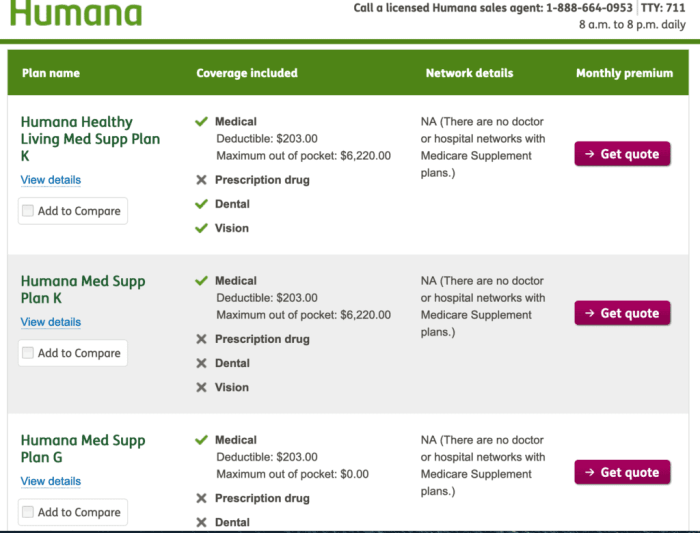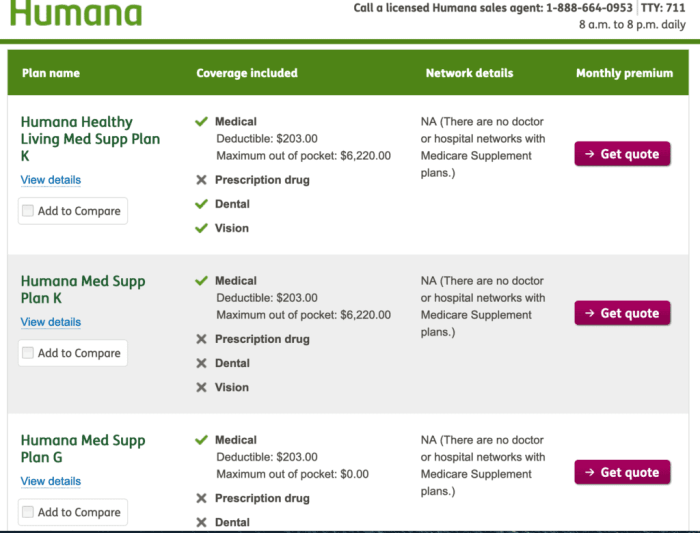Humana supplemental insurance sets the stage for a comprehensive approach to healthcare, offering a layer of protection beyond traditional insurance. This type of insurance, often referred to as “gap” coverage, is designed to fill in the gaps left by primary health insurance plans, providing financial relief for unexpected medical expenses. Humana, a well-established name in the health insurance industry, has carved a niche in the supplemental insurance market, offering a range of plans tailored to different needs and budgets.
Table of Contents
These supplemental plans can help individuals and families manage out-of-pocket costs associated with medical procedures, hospital stays, prescription drugs, and other healthcare services. By offering additional coverage, Humana supplemental insurance can provide peace of mind and financial security, knowing that you have a safety net in place should unexpected medical expenses arise.
Eligibility and Enrollment

Humana supplemental insurance plans can provide additional coverage for medical expenses not covered by your primary health insurance. To be eligible for Humana supplemental insurance, you typically need to meet certain criteria. These criteria may vary depending on the specific plan you are interested in.
Eligibility Requirements
The eligibility requirements for Humana supplemental insurance plans typically include:
- Being enrolled in a primary health insurance plan, such as Medicare, Medicaid, or a private health insurance plan.
- Meeting the plan’s age requirements, which may vary depending on the specific plan.
- Residing in a state where Humana offers supplemental insurance plans. Humana offers plans in many states across the United States.
- Not having any pre-existing conditions that are excluded from coverage under the plan.
Enrollment Process
The enrollment process for Humana supplemental insurance plans typically involves the following steps:
- Contact Humana: You can contact Humana directly by phone, online, or through a licensed insurance agent to inquire about available plans and eligibility requirements.
- Complete an Application: Once you have chosen a plan, you will need to complete an application, which may include providing information about your health history, current insurance coverage, and other relevant details.
- Provide Documentation: You may need to provide supporting documentation, such as your primary health insurance card, proof of residency, and other relevant documents, to verify your eligibility and complete the enrollment process.
- Review and Approval: Humana will review your application and documentation. Once your application is approved, you will be enrolled in the plan and receive your insurance card and policy information.
Plan Availability
Humana offers supplemental insurance plans in various states across the United States. The availability of specific plans may vary depending on your location. To determine if Humana offers supplemental insurance plans in your state, you can contact Humana directly or visit their website.
Humana Supplemental Insurance vs. Traditional Insurance

Humana supplemental insurance and traditional health insurance plans are both designed to help cover healthcare costs, but they function in different ways. Understanding the key differences between these two types of insurance is crucial for choosing the best coverage option based on your individual healthcare needs and budget.
Key Differences Between Humana Supplemental Insurance and Traditional Health Insurance
Traditional health insurance plans are typically comprehensive and act as your primary coverage. They cover a wide range of medical expenses, including doctor’s visits, hospital stays, and prescription drugs, subject to deductibles, copayments, and coinsurance. On the other hand, Humana supplemental insurance, often referred to as “gap” insurance, is designed to fill the gaps in coverage left by your primary health insurance plan. It helps pay for out-of-pocket costs, such as deductibles, copayments, and coinsurance, that your traditional plan doesn’t fully cover.
Advantages and Disadvantages of Each Type of Insurance
Advantages of Traditional Health Insurance
- Comprehensive Coverage: Traditional health insurance plans offer broad coverage for a wide range of medical services, including preventive care, hospitalization, and prescription drugs.
- Lower Premiums: Compared to supplemental insurance, traditional health insurance plans generally have lower monthly premiums, especially for younger and healthier individuals.
- Access to a Wider Network: Traditional plans usually have larger provider networks, giving you more options for choosing healthcare providers.
Disadvantages of Traditional Health Insurance
- Higher Deductibles and Out-of-Pocket Costs: Traditional plans often have higher deductibles and out-of-pocket expenses, meaning you may need to pay a significant amount before your insurance kicks in.
- Limited Coverage for Specific Services: While comprehensive, traditional plans may have limitations or exclusions for certain services, such as dental, vision, or mental health care.
- Annual Limits on Coverage: Some traditional plans may have annual limits on coverage, which can be a concern for individuals with chronic health conditions.
Advantages of Humana Supplemental Insurance
- Lower Premiums: Supplemental insurance plans generally have lower premiums than traditional health insurance plans, making them a more affordable option for individuals with lower healthcare needs.
- Targeted Coverage: Supplemental insurance focuses on covering specific out-of-pocket costs, such as deductibles, copayments, and coinsurance, which can be particularly helpful for individuals who anticipate high healthcare expenses.
- Flexibility: Supplemental insurance can be purchased independently of your primary health insurance plan, providing you with greater flexibility in choosing coverage options.
Disadvantages of Humana Supplemental Insurance
- Limited Coverage: Supplemental insurance only covers specific out-of-pocket costs, and it doesn’t replace your primary health insurance plan. It acts as an add-on to your existing coverage.
- May Not Cover All Expenses: Supplemental insurance may not cover all out-of-pocket expenses, especially for individuals with complex medical needs or high healthcare costs.
- May Have Waiting Periods: Some supplemental insurance plans may have waiting periods before certain benefits become effective.
Scenarios Where Humana Supplemental Insurance May Be Suitable
Humana supplemental insurance can be a valuable option for individuals in various scenarios:
- Individuals with High Deductibles: If you have a high deductible health plan, supplemental insurance can help you cover the deductible and reduce your out-of-pocket costs.
- Individuals with Chronic Health Conditions: Supplemental insurance can help cover the high costs associated with managing chronic health conditions, such as diabetes or heart disease.
- Individuals Who Expect High Healthcare Expenses: If you anticipate high healthcare costs due to upcoming surgeries or treatments, supplemental insurance can provide additional financial protection.
- Individuals on a Tight Budget: Supplemental insurance can be a more affordable option than traditional health insurance, especially for individuals with lower healthcare needs.
Humana supplemental insurance offers a valuable solution for individuals and families seeking enhanced healthcare coverage and financial protection. By understanding the benefits, plans, and eligibility requirements, you can make an informed decision about whether this type of insurance is right for your specific healthcare needs. With its focus on bridging coverage gaps and mitigating out-of-pocket expenses, Humana supplemental insurance can provide a vital layer of protection in today’s complex healthcare landscape.
Humana supplemental insurance can be a valuable addition to your health plan, offering coverage for a wide range of services. If you’re looking for a plan that includes vision coverage, you might consider Humana Gold Plus Vision, which provides comprehensive eye care benefits. humana gold plus vision is just one example of the many supplemental plans Humana offers, each designed to cater to specific needs and budgets.


